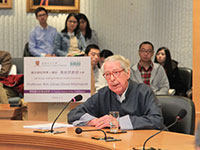 The Institute of Chinese Studies is pleased to invite Professor Nils Göran David Malmqvist, first Jao Tsung-I Visiting Professor, to deliver a public lecture on 3 March 2014 entitled On Popular Poetry of the Tang Period. The Institute of Chinese Studies is pleased to invite Professor Nils Göran David Malmqvist, first Jao Tsung-I Visiting Professor, to deliver a public lecture on 3 March 2014 entitled On Popular Poetry of the Tang Period.
The first Jao Tsung-I Visiting Professor, Professor Nils Göran David Malmqvist, is a leading Swedish sinologist. Professor Malmqvist received his degree from Uppsala University, and in 1946 continued his studies into ancient Chinese literature and Chinese phonology at Stockholm University, under the eminent sinologist Professor Bernhard Karlgren, where he obtained a Fil. Lic. in Chinese. In the sixty or so years since then, Professor Malmqvist has been actively involved in Chinese literary studies and translation, and has taught Chinese in leading universities in Europe and Australia. Professor Malmqvist is a prolific writer with extensive knowledge of Chinese culture. Over the years, he has published many works in English and Swedish on Chinese history and literature. He has translated over 30 volumes and some 200 Chinese literary pieces. He has contributed greatly to the promotion of academic and cultural exchange between Sweden and China (including Hong Kong), and between Chinese and Western cultures in general. His distinguished achievements have earned him numerous awards, such as the Knighthood of the Northern Star, the Royal Prize from the Swedish Academy and the Royal Swedish Academy of Sciences Translation Prize. He has also served as member of the selection committee for the Nobel Prize for Literature. In 1998, Professor Malmqvist was made Doctor of Literature of the Chinese University of Hong Kong, honoris causa. Professor Malmqvist maintains a very close relationship with CUHK. He is a member of the Advisory Board of the Journal of Translation Studies, published by the Department of Translation, and Renditions, a Chinese-English translation magazine published by the Research Centre for Translation. In October 1990, he spent seven months as Renditions Fellow of the Centre at CUHK. In these capacities he has contributed invaluable professional advice to the University. In his lecture, Professor Malmqivist discussed a Tang manuscript discovered in 1969, the《十二月三臺詞》. The rhythm and rhyme scheme of this ci (song lyric) is not common, and it may well be the first six-syllable lüshi (regulated verse) in the history of Chinese literature. The lecture discussed the differences in rhythm and rhyme schemes between the '十二月歌' of unconventional poets and the so-called '三臺詩', and the development of the six-syllable jueju (quatrain) in the Tang period. It was Professor Jao Tsung-I's opinion, in his introduction to《敦煌曲》 (Airs de Touen-Houang), that the distinction between shi and ci during the Tang period was not obvious. This view was expanded and supported by Professor Malmqivist. |













